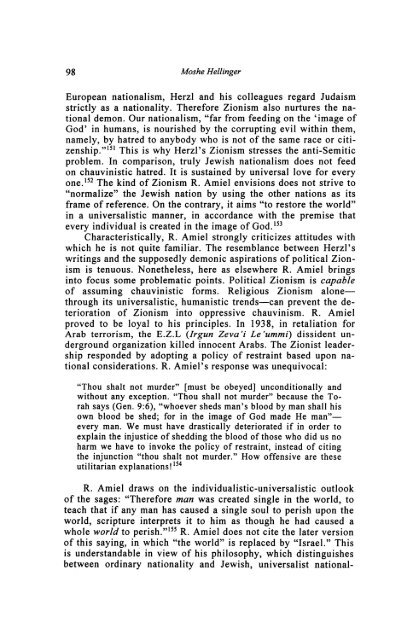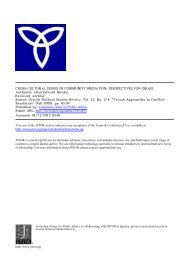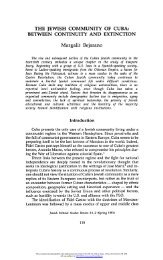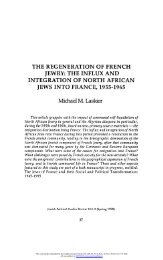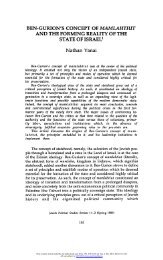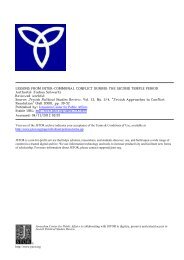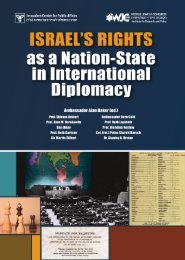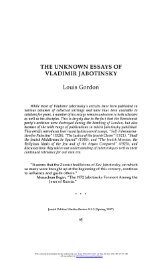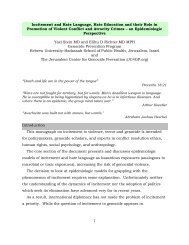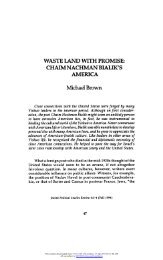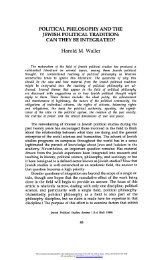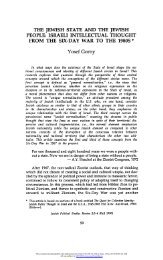individual and society, nationalism and universalism in the religious ...
individual and society, nationalism and universalism in the religious ...
individual and society, nationalism and universalism in the religious ...
You also want an ePaper? Increase the reach of your titles
YUMPU automatically turns print PDFs into web optimized ePapers that Google loves.
98<br />
Moshe Hell<strong>in</strong>ger<br />
European <strong>nationalism</strong>, Herzl <strong>and</strong> his colleagues regard Judaism<br />
strictly as a nationality. Therefore Zionism also nurtures <strong>the</strong> na<br />
tional demon. Our <strong>nationalism</strong>, "far from feed<strong>in</strong>g on <strong>the</strong> 'image of<br />
God' <strong>in</strong> humans, is nourished by <strong>the</strong> corrupt<strong>in</strong>g evil with<strong>in</strong> <strong>the</strong>m,<br />
namely, by hatred to anybody who is not of <strong>the</strong> same race or citi<br />
zenship."151 This is why Herzl's Zionism stresses <strong>the</strong> anti-Semitic<br />
problem.<br />
In comparison, truly Jewish <strong>nationalism</strong> does not feed<br />
on chauv<strong>in</strong>istic hatred. It is susta<strong>in</strong>ed by universal love for every<br />
one.152 The k<strong>in</strong>d of Zionism R. Amiel envisions does not strive to<br />
"normalize" <strong>the</strong> Jewish nation by us<strong>in</strong>g <strong>the</strong> o<strong>the</strong>r nations as its<br />
frame of reference. On <strong>the</strong> contrary, it aims "to restore <strong>the</strong> world"<br />
<strong>in</strong> a universalistic manner, <strong>in</strong> accordance with <strong>the</strong> premise<br />
every <strong><strong>in</strong>dividual</strong> is created <strong>in</strong> <strong>the</strong> image of God.153<br />
that<br />
Characteristically, R. Amiel strongly criticizes attitudes with<br />
which he is not<br />
quite familiar. The resemblance between Herzl's<br />
writ<strong>in</strong>gs <strong>and</strong> <strong>the</strong> supposedly demonic aspirations of political Zion<br />
ism is tenuous. None<strong>the</strong>less, here as elsewhere R. Amiel br<strong>in</strong>gs<br />
<strong>in</strong>to focus some problematic po<strong>in</strong>ts. Political Zionism is capable<br />
of assum<strong>in</strong>g chauv<strong>in</strong>istic forms. Religious Zionism alone?<br />
through its universalistic, humanistic trends?can prevent <strong>the</strong> de<br />
terioration of Zionism <strong>in</strong>to oppressive chauv<strong>in</strong>ism. R. Amiel<br />
proved to be loyal to his pr<strong>in</strong>ciples. In 1938, <strong>in</strong> retaliation for<br />
Arab terrorism, <strong>the</strong> E.Z.L (Irgun Zeva'i Le'ummi) dissident un<br />
derground organization killed <strong>in</strong>nocent Arabs. The Zionist leader<br />
ship responded by adopt<strong>in</strong>g a policy of restra<strong>in</strong>t based upon na<br />
tional considerations. R. Amiel's response was unequivocal:<br />
"Thou shalt not murder" [must be obeyed] unconditionally <strong>and</strong><br />
without any exception. "Thou shall not murder" because <strong>the</strong> To<br />
rah says (Gen. 9:6), "whoever sheds man's blood by man shall his<br />
own blood be shed; for <strong>in</strong> <strong>the</strong> image of God made He man"?<br />
every man. We must have drastically deteriorated if <strong>in</strong> order to<br />
expla<strong>in</strong> <strong>the</strong> <strong>in</strong>justice of shedd<strong>in</strong>g <strong>the</strong> blood of those who did us no<br />
harm we have to <strong>in</strong>voke <strong>the</strong> policy of restra<strong>in</strong>t, <strong>in</strong>stead of cit<strong>in</strong>g<br />
<strong>the</strong> <strong>in</strong>junction "thou shalt not murder." How offensive are <strong>the</strong>se<br />
utilitarian<br />
explanations!154<br />
R. Amiel draws on <strong>the</strong> <strong><strong>in</strong>dividual</strong>istic-universalistic outlook<br />
of <strong>the</strong> sages: "Therefore man was created s<strong>in</strong>gle <strong>in</strong> <strong>the</strong> world, to<br />
teach that if any man has caused a s<strong>in</strong>gle soul to perish upon <strong>the</strong><br />
world, scripture <strong>in</strong>terprets it to him as though he had caused a<br />
whole world to<br />
perish."155<br />
R. Amiel does not cite <strong>the</strong> later version<br />
of this say<strong>in</strong>g, <strong>in</strong> which "<strong>the</strong> world" is replaced by "Israel." This<br />
is underst<strong>and</strong>able <strong>in</strong> view of his philosophy, which dist<strong>in</strong>guishes<br />
between ord<strong>in</strong>ary nationality <strong>and</strong> Jewish, universalist national


